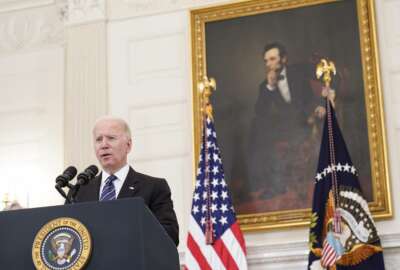Lawmakers press White House for details on efforts to boost diversity across national security workforce
One year after President Biden directed agencies to strengthen the national security workforce, details on progress are scarce.
House Democrats are pushing the White House to release internal reports on the administration’s proposals to strengthen the national security workforce, including efforts to increase diversity, equity, inclusion and accessibility.
Last February, President Joe Biden signed a memo directing agencies to close critical skills gaps across the national security workforce and “win the race for talent.” The memo established an “interagency working group” to coordinate the development of new workforce proposals.
But in the year since, public details on the working group’s activities are scarce.
In a Jan. 19 letter to Principal Deputy National Security Adviser Jon Finer, nine Democrats on the House Permanent Select Committee on Intelligence asked the White House for an update on the group’s progress.
The letter focuses on the diversity elements throughout Biden’s memo, which directs the working group to task agencies with addressing multiple DEIA issues.
“In response to the public’s growing interest in the Biden administration’s commitment to diversity, equity and inclusion, we would like to be able to inform our constituents about the steps being taken to address inequities in our federal government, particularly within our national security workforce,” lawmakers wrote.
The letter notes that the working group should have produced two quarterly reports over the past year, while an annual report on the group’s progress was due last Friday.
Citing the Biden directive’s commitment to transparency, the lawmakers requested that “the existing quarterly reports and all future quarterly and annual reports be released publicly.”
The National Security Council did not respond to a request for comment.
Rep. Joaquin Castro (D-Tx.), one of the letter’s signatories, said the working group’s efforts should be public.
“Within reasonable limits, the Biden administration should strive for maximum transparency about the federal workforce so we can identify and address inequities in our government,” Castro said in a statement provided by his office.
Biden’s memo directed agencies to strengthen diversity and inclusion “by sex, race, ethnicity, sexual orientation, gender identity, veteran status, disability, and economic, regional, and immigrant backgrounds, including at senior levels.”
That section of the national security workforce directive coincides with a broader push for diversity, equity and inclusion across the administration. Last June, Biden signed an executive order directing an array of actions to increase diversity, equity, inclusion and accessibility across the federal workforce.
But within the national security community, there’s a “reluctance to be transparent” on workforce issues compared to their civilian counterparts, according to Mark Hanis, co-founder of Inclusive America, which tracks diversity, equity and inclusion efforts and data across government. The group posted the House committee’s letter on its website.
“By being transparent about what they’re working on, it builds trust,” said Hanis, a former White House fellow who worked on national security issues in the Obama administration for then-Vice President Biden.
Biden’s national security workforce directive also sought proposals to improve retention and support of national security employees, as well as “support for those serving overseas and their families, including those with LGBTQI+ members and with special needs.”
The memo additionally asks for an assessment of security clearance reforms and reciprocity proposals, as well as “additional reforms to eliminate bias, and ensure efficient timelines for completion of security clearance investigations.”
And it directed a review of how the national security workforce could better accommodate individuals with disabilities.
Hanis said he’s not expecting the working group to release all of its internal deliberations, but is hoping for as much detail as possible.
“We think getting something on the scoreboard is important” with regard to DEIA in the national security workforce, he said.
Copyright © 2025 Federal News Network. All rights reserved. This website is not intended for users located within the European Economic Area.
Follow @jdoubledayWFED






